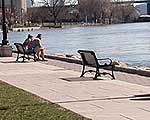By Tim Post
Minnesota Public Radio
May 6, 2002
As Minnesota was settled, the first towns sprung up along the Mississippi River. At first, cities used the river for transportation and to power industry. Over the years communities turned their backs on the Mississippi. People ignored the natural resource to focus on development away from the water. But now cities are finding new value in their rivers. St. Cloud is one example.
| |||
| |
|
||
|
|||
It's a calm, chilly morning on the Mississippi near downtown St. Cloud. The sun is just beginning to rise above the river banks. A fresh-baked smell wafts down from a bread factory on the east side of the city.
St. Cloud State University's rowing team is skimming across the water in an eight-man shell. They practice here at 5:30 every morning.
Kevin Lynch takes care of the team's equipment. This morning he's sitting in the catch boat. His job is to pull rowers out of the cold water in case they tip.
The Mississippi is a swift river as it flows through St. Cloud. It's only a few city blocks wide and surrounded by high banks. Lynch appreciates the beauty of the river.
"We have a great stretch of the Mississippi. When we go to other regattas and races down south, and we keep going further down the river, it gets yucky, mucky, gross. This is the best part right up here," Lynch says.
The empty river is great for rowing.
"There's no one else out here with us either, it's just empty. They really don't do anything up here, we really are the only thing out here," Lynch says.
| |
|
|
|
||
Downtown St. Cloud looms on the high river bank above Lynch's boat. It's a community that some say is ignoring its river.
"It's hard to tell this is a river town, even standing here in the heart of downtown St. Cloud," says St. Cloud City Council member Mike Landy. "We're only a few hundred feet away from the Mississippi River, but we can't walk down to it, we can't even see it. And that's the problem...St. Cloud has shut itself off from what could be it's most valuable resource...We just need to focus on the river. I don't think we need to change things that much."
Landy sits in a quiet riverside park along the Mississippi. He likes this park, because it has a great view of the river - something downtown St. Cloud doesn't have.
Landy says that's because during the city's downtown urban renewal in the 1970s and '80s, no one considered the beauty of the river as an asset.
"With hindsight we're looking back and saying, 'Oh, that was a big mistake. Wouldn't it have been nice if we would've done that differently?' And I have some instinct that were they to do that again today, and they were to make those decisions, it would be the total opposite," Landy says.
| |
|
|
|
||
Landy has big plans for how the city uses the Mississippi. He wants more public spaces, riverside restaurants, and a trail system. He and a group of residents are working to develop a water taxi system that would shuttle tourists up and down the Mississippi.
Landy is confident the water taxi could be running within a few years. At about $500,000, he considers the startup cost reasonable, and hopes they'll secure funding soon. Landy says whatever the city does, it needs to take advantage of its place on the river.
Other cities have been successful using the river as a source for recreation. La Crosse, Wis. is one example.
La Crosse has spent more than $1 million over the past 20 years, turning its dirty industrial riverfront into a park and lake walks.
Mayor John Medinger says using this area for recreation wasn't in the city's plans until the mid 1970s. After years of growing away from the river, La Crosse did an about-face.
"All of a sudden, people said, 'Hey, there's the Mississippi River, we hadn't looked.' The French guys came here in 1680, and about 300 years later we discovered it again. We decided what makes La Crosse special is this Mississippi River," Medinger says.
| |
|
|
|
||
Officials at St. Cloud State University say they started connecting residents with the river years ago. The university bought land that contained old industrial relics, like a packing plant and a coal power plant. The university tore down the buildings, returned the land to green space, and turned over a thin strip to the city. Today, that portion is part of a city trail system.
Steven Ludwig, St. Cloud State's vice president of administration, says providing riverside recreation is part of the school's mission.
"It's people down here engaged with the river, enjoying the river and understanding it better," says Ludwig. "That's what we really hope to see is people both from our campus and the community engaged with the river. We've come a long way toward that now, and I think we're continuing to move there."
Ludwig says the school's need for a new stadium will get even more people near the river. The college plans to build a new 4,000-seat football stadium near the river. But that part of St. Cloud State's mission is making some environmentalists nervous.
Charlotte Stephens, who chairs the St. Cloud Area Environmental Council, says St. Cloud State's riverfront has a special designation.
| |
|
|
|
||
It's part of the Minnesota Department of Natural Resources' Wild and Scenic River Management Project. That means there are strict regulations regarding development along this stretch of river, even though it's in the city.
"It's our concern that if the wild and scenic regulations are not applied here and this place gets developed, what's to stop something from going next to this and continuing on down the river - to the point where the natural part is gone," says Stephens.
Stephens says her fear is that a stadium near the river will obstruct scenic river views. She says the stadium could also contribute light pollution and runoff.
St. Cloud State officials say they are working with the DNR to satisfy all the requirements. And they say building regulations aren't as strict near SCSU, because the river here is considered scenic and not wild.
On a recent spring day, St. Cloud State student Lane Wilcox was tossing a frisbee to his dog Kita, along the river in south St. Cloud. He's not in favor of building a stadium here along the Mississippi River. But he hopes that downtown St. Cloud gets a new park along the river.
"It would be a good place for people downtown to go and have their lunches, and to just sit and enjoy it," says Wilcox. "That's what the town needs - more parks and more places to enjoy your day...It would probably help with the St. Cloud economy. It would make it a nice place to be."
More Information




